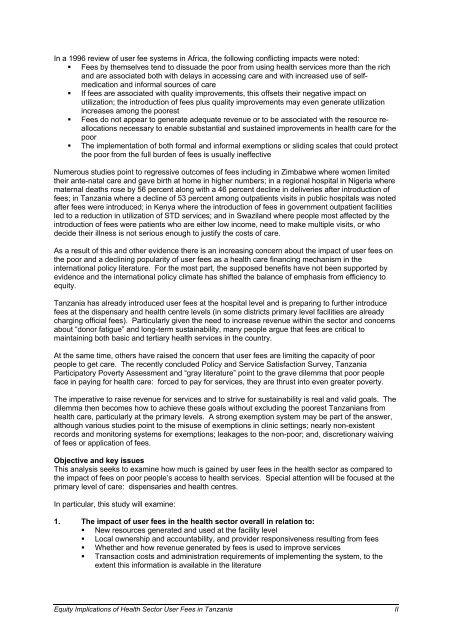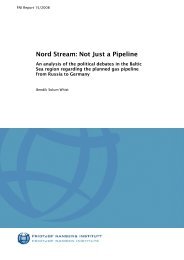equity implications of health sector user fees in tanzania
equity implications of health sector user fees in tanzania
equity implications of health sector user fees in tanzania
Create successful ePaper yourself
Turn your PDF publications into a flip-book with our unique Google optimized e-Paper software.
In a 1996 review <strong>of</strong> <strong>user</strong> fee systems <strong>in</strong> Africa, the follow<strong>in</strong>g conflict<strong>in</strong>g impacts were noted:<br />
� Fees by themselves tend to dissuade the poor from us<strong>in</strong>g <strong>health</strong> services more than the rich<br />
and are associated both with delays <strong>in</strong> access<strong>in</strong>g care and with <strong>in</strong>creased use <strong>of</strong> selfmedication<br />
and <strong>in</strong>formal sources <strong>of</strong> care<br />
� If <strong>fees</strong> are associated with quality improvements, this <strong>of</strong>fsets their negative impact on<br />
utilization; the <strong>in</strong>troduction <strong>of</strong> <strong>fees</strong> plus quality improvements may even generate utilization<br />
<strong>in</strong>creases among the poorest<br />
� Fees do not appear to generate adequate revenue or to be associated with the resource reallocations<br />
necessary to enable substantial and susta<strong>in</strong>ed improvements <strong>in</strong> <strong>health</strong> care for the<br />
poor<br />
� The implementation <strong>of</strong> both formal and <strong>in</strong>formal exemptions or slid<strong>in</strong>g scales that could protect<br />
the poor from the full burden <strong>of</strong> <strong>fees</strong> is usually <strong>in</strong>effective<br />
Numerous studies po<strong>in</strong>t to regressive outcomes <strong>of</strong> <strong>fees</strong> <strong>in</strong>clud<strong>in</strong>g <strong>in</strong> Zimbabwe where women limited<br />
their ante-natal care and gave birth at home <strong>in</strong> higher numbers; <strong>in</strong> a regional hospital <strong>in</strong> Nigeria where<br />
maternal deaths rose by 56 percent along with a 46 percent decl<strong>in</strong>e <strong>in</strong> deliveries after <strong>in</strong>troduction <strong>of</strong><br />
<strong>fees</strong>; <strong>in</strong> Tanzania where a decl<strong>in</strong>e <strong>of</strong> 53 percent among outpatients visits <strong>in</strong> public hospitals was noted<br />
after <strong>fees</strong> were <strong>in</strong>troduced; <strong>in</strong> Kenya where the <strong>in</strong>troduction <strong>of</strong> <strong>fees</strong> <strong>in</strong> government outpatient facilities<br />
led to a reduction <strong>in</strong> utilization <strong>of</strong> STD services; and <strong>in</strong> Swaziland where people most affected by the<br />
<strong>in</strong>troduction <strong>of</strong> <strong>fees</strong> were patients who are either low <strong>in</strong>come, need to make multiple visits, or who<br />
decide their illness is not serious enough to justify the costs <strong>of</strong> care.<br />
As a result <strong>of</strong> this and other evidence there is an <strong>in</strong>creas<strong>in</strong>g concern about the impact <strong>of</strong> <strong>user</strong> <strong>fees</strong> on<br />
the poor and a decl<strong>in</strong><strong>in</strong>g popularity <strong>of</strong> <strong>user</strong> <strong>fees</strong> as a <strong>health</strong> care f<strong>in</strong>anc<strong>in</strong>g mechanism <strong>in</strong> the<br />
<strong>in</strong>ternational policy literature. For the most part, the supposed benefits have not been supported by<br />
evidence and the <strong>in</strong>ternational policy climate has shifted the balance <strong>of</strong> emphasis from efficiency to<br />
<strong>equity</strong>.<br />
Tanzania has already <strong>in</strong>troduced <strong>user</strong> <strong>fees</strong> at the hospital level and is prepar<strong>in</strong>g to further <strong>in</strong>troduce<br />
<strong>fees</strong> at the dispensary and <strong>health</strong> centre levels (<strong>in</strong> some districts primary level facilities are already<br />
charg<strong>in</strong>g <strong>of</strong>ficial <strong>fees</strong>). Particularly given the need to <strong>in</strong>crease revenue with<strong>in</strong> the <strong>sector</strong> and concerns<br />
about “donor fatigue” and long-term susta<strong>in</strong>ability, many people argue that <strong>fees</strong> are critical to<br />
ma<strong>in</strong>ta<strong>in</strong><strong>in</strong>g both basic and tertiary <strong>health</strong> services <strong>in</strong> the country.<br />
At the same time, others have raised the concern that <strong>user</strong> <strong>fees</strong> are limit<strong>in</strong>g the capacity <strong>of</strong> poor<br />
people to get care. The recently concluded Policy and Service Satisfaction Survey, Tanzania<br />
Participatory Poverty Assessment and “gray literature” po<strong>in</strong>t to the grave dilemma that poor people<br />
face <strong>in</strong> pay<strong>in</strong>g for <strong>health</strong> care: forced to pay for services, they are thrust <strong>in</strong>to even greater poverty.<br />
The imperative to raise revenue for services and to strive for susta<strong>in</strong>ability is real and valid goals. The<br />
dilemma then becomes how to achieve these goals without exclud<strong>in</strong>g the poorest Tanzanians from<br />
<strong>health</strong> care, particularly at the primary levels. A strong exemption system may be part <strong>of</strong> the answer,<br />
although various studies po<strong>in</strong>t to the misuse <strong>of</strong> exemptions <strong>in</strong> cl<strong>in</strong>ic sett<strong>in</strong>gs; nearly non-existent<br />
records and monitor<strong>in</strong>g systems for exemptions; leakages to the non-poor; and, discretionary waiv<strong>in</strong>g<br />
<strong>of</strong> <strong>fees</strong> or application <strong>of</strong> <strong>fees</strong>.<br />
Objective and key issues<br />
This analysis seeks to exam<strong>in</strong>e how much is ga<strong>in</strong>ed by <strong>user</strong> <strong>fees</strong> <strong>in</strong> the <strong>health</strong> <strong>sector</strong> as compared to<br />
the impact <strong>of</strong> <strong>fees</strong> on poor people’s access to <strong>health</strong> services. Special attention will be focused at the<br />
primary level <strong>of</strong> care: dispensaries and <strong>health</strong> centres.<br />
In particular, this study will exam<strong>in</strong>e:<br />
1. The impact <strong>of</strong> <strong>user</strong> <strong>fees</strong> <strong>in</strong> the <strong>health</strong> <strong>sector</strong> overall <strong>in</strong> relation to:<br />
� New resources generated and used at the facility level<br />
� Local ownership and accountability, and provider responsiveness result<strong>in</strong>g from <strong>fees</strong><br />
� Whether and how revenue generated by <strong>fees</strong> is used to improve services<br />
� Transaction costs and adm<strong>in</strong>istration requirements <strong>of</strong> implement<strong>in</strong>g the system, to the<br />
extent this <strong>in</strong>formation is available <strong>in</strong> the literature<br />
Equity Implications <strong>of</strong> Health Sector User Fees <strong>in</strong> Tanzania II













